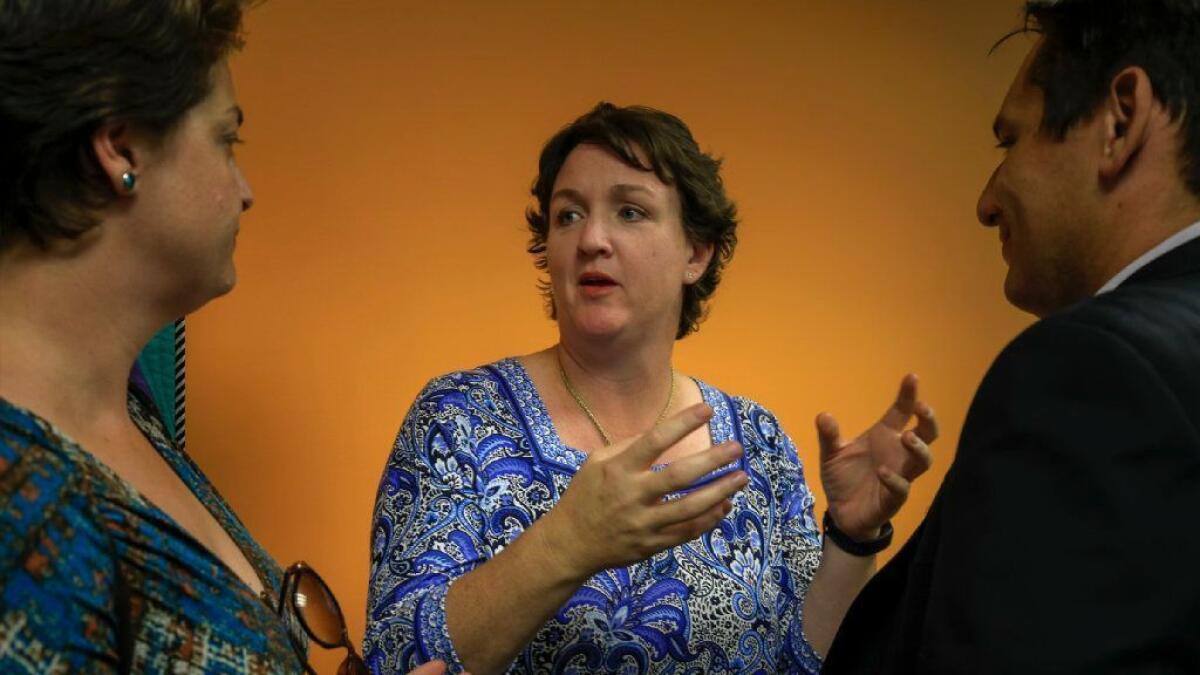Surprise medical bills could prompt rare bipartisan action in Congress

- Share via
Reporting from Washington — Even through the pain of a burst appendix just weeks before election day, Katie Porter made sure her campaign manager took her to Hoag Hospital in Irvine — and not to a closer hospital — because she knew the emergency room was in her insurance network.
An appendectomy followed, plus five days in the hospital on IV antibiotics. About $55,000 worth of services was covered by her Anthem Blue Cross insurance policy with only a $250 co-pay from Porter. But a few weeks later, she said, she was hit with a $3,231 bill from the surgeon who, despite operating in a hospital in the Anthem network, was not in the network himself. That left Porter on the hook for $2,800 out of pocket.
Porter, a Democrat elected in November to represent Irvine in Congress, was hit with a surprise medical bill — a phenomenon that happens in upward of 20% of emergency room visits, according to estimates.
With Congress mired in a political standoffwith the executive branch, Republicans and Democrats are struggling to garner enough support to get any bills signed into law. But legislation to address surprise billing could be one of the few bipartisan initiatives that make it to President Trump’s desk this year.
Porter, who will share her story Tuesday at one of several congressional hearings expected in the coming weeks, said support for the legislation was a sign of how common the problem had become.
“It’s not a special story because I’m a member of Congress. It’s actually that this is such an ordinary experience,” Porter said in an interview. “As we’re trying to encourage Americans to buy insurance in the face of higher premiums, we’re trying to encourage employers to continue to provide coverage. To then not have the insurance system working to protect people from unexpected problems is a real problem.”
Trump earlier this month called for a solution. “This must end,” he said at a White House event including Republican lawmakers and at least one Democrat. “We’re going to hold insurance companies and hospitals totally accountable.”
Health insurance deductibles soar, leaving Americans with unaffordable bills »
Republicans and Democrats have introduced several preliminary ideas for how to address the problem, including capping out-of-network bills at a certain rate or requiring physicians in such situations to be paid at the in-network rates even if they don’t have a contract with the insurance company.
Other proposals would require arbitration between an insurance company and hospital or healthcare providers. Trump floated the idea of patients getting a single bill from a trip to the ER, and his White House appears to disfavor an arbitration approach, according to people familiar with the early discussions.
Several states, including California and New York, have established their own surprise-billing laws. Federal legislation is not expected to override what states have done.
Sens. Lamar Alexander (R-Tenn.) and Patty Murray (D-Wash.) are putting together a more expansive healthcare package that would address the surprise bills as well as try to bring down healthcare costs. A preliminary version of the bill is expected to be released as soon as this week, and Alexander said he hoped to have a plan on the Senate floor by July. The effort could be combined with legislation expected out of the Senate Finance Committee to address prescription drug costs.
Alexander and Murray, one of the most productive bipartisan deal-making teams in Congress, tried last year to put together legislation to make minor changes to the Affordable Care Act, but it was bogged down by political disputes over abortion funding.
While Republicans and Democrats have been at loggerheads over healthcare policy for the last decade, ending surprise medical billing has garnered bipartisan support. The question facing lawmakers now is whether they can come together on a bill without being distracted by debates on congressional oversight or Obamacare.
Sen. Chris Murphy (D-Conn.), who with Sen. Tammy Baldwin (D-Wis.) is advocating to undo a Trump administration rule allowing insurers not to abide by all of the ACA’s rules, is skeptical of giving Republicans any political leverage on the issue.
“I worry that Republicans are going to try to distract the American public from the fact that they are repeatedly stabbing you in the leg by putting a Band-Aid on a small cut on your finger,” Murphy said of the bill on surprise billing and healthcare costs. “Maybe I’ll be surprised and there is really groundbreaking stuff in there.”
Health insurance companies, hospitals and provider groups are already lobbying in anticipation of a bill. Anthem Blue Cross says it is trying to work with its in-network hospitals to ensure all physicians participate in the network. But the company put some blame on the physicians themselves.
“There are some physicians who choose not to participate in our network,” said Anthem spokesman Michael Bowman. “This refusal allows them to charge consumers excessive amounts, well above what is customary and far greater than what we reimburse for out-of-network services.”
If successful, legislation to address surprise billing — or a broader healthcare bill — could amount to one of the most substantial policy efforts of this Congress, outside of a potential revamped North American Free Trade Agreement or a new federal spending plan. With Republicans controlling the Senate and Democrats controlling the House, even a plan to help states recover from disasters, including the California wildfires, has been a significant lift.
“It’s magical when good policy matches good politics,” said Rep. Greg Walden of Oregon, the top Republican on the House Energy and Commerce Committee, who worked with the top Democrat on the panel on one of the surprise-billing proposals.
Porter got hit with a surprise medical bill even though she knew off the top of her head which hospitals were in network. Many consumers are not that well prepared or informed, particularly during an emergency.
She credits her former employer, UC Irvine, for advocating on her behalf with the insurance company, which ultimately paid the bill. She also had the time to sit on the phone and navigate an insurance company’s bureaucracy — a luxury she said most Americans didn’t have.
“I didn’t have to find time during a 10-minute break,” she said, “which is what so many Americans are confronted with. They can’t even find the hour to sit on hold and navigate through the phone tree to find the appeal department.”
More stories from Jennifer Haberkorn »
More to Read
Get the L.A. Times Politics newsletter
Deeply reported insights into legislation, politics and policy from Sacramento, Washington and beyond. In your inbox three times per week.
You may occasionally receive promotional content from the Los Angeles Times.











